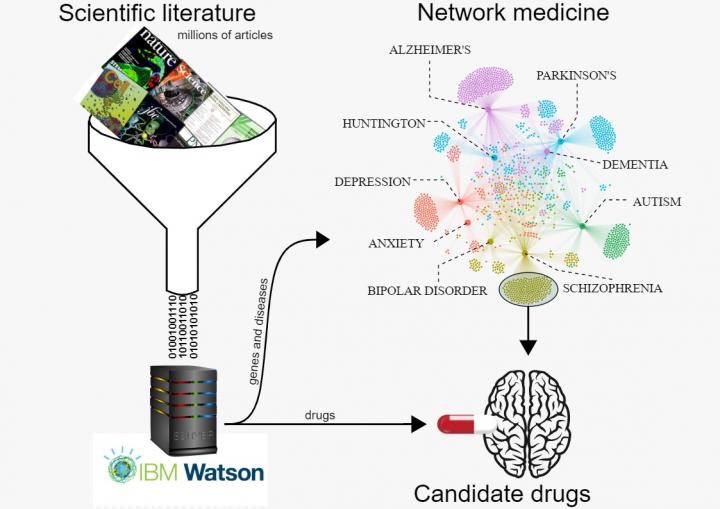Researchers have correlated information on drugs, genes and diseases to identify potential candidates for psychiatric and neurological treatment; the methodology they developed will be used to search for drugs against COVID-19

Credit: Thomaz Lüscher Dias
Artificial intelligence can increase the effectiveness of drug repositioning or repurposing research, according to a study published in Translational Psychiatry. In the study, which was supported by São Paulo Research Foundation – FAPESP, Brazilian researchers correlated information on genes associated with psychiatric and neurological disorders and drugs approved for use in treating other diseases that might potentially inhibit or activate these genes.
The study identified 63 drugs targeting 31 genes and potential candidates for testing against Alzheimer’s disease, Parkinson’s disease, Huntington’s disease, depression, anxiety, bipolar disorder, schizophrenia and autism. A total of 1,588 genes were correlated with 722 drugs.
In addition to identifying these candidate drugs, the researchers also developed a novel drug screening approach that can be used in studies of other diseases. They then applied the novel methodology in another study with the aim of repurposing drugs to treat COVID-19.
“We are producing much more knowledge than we can absorb. Scientific journals publish more than a million articles per year, so it is impossible to keep abreast of the literature in areas other than one’s research interests,” Helder Nakaya , principal investigator for the study, told.
Nakaya is a professor at the University of São Paulo’s School of Pharmaceutical Sciences (FCF-USP) in Brazil and a senior researcher at the Center for Research on Inflammatory Diseases (CRID), one of the Research, Innovation and Dissemination Centers (RIDCs ) funded by FAPESP.
Novel approach: network medicine
Drug development requires large amounts of time and money. Repurposing can be a vital shortcut because existing drugs have already passed the relevant safety tests. The usual approach is to study how drugs and diseases share molecular mechanisms.
To make these correlations more effective, the researchers used a machine learning approach known as network medicine to investigate the molecular characteristics and mechanisms of psychiatric and neurological disorders.
Network medicine is an emerging field that combines systems biology and network science to understand how genes interact in disease and health. “We organized and structured a network of knowledge about psychiatric and neurological disorders correlating with information about relevant drugs and genes,” Nakaya explained. “Network medicine uses graph theory to analyze these complex interactions and suggest drugs that have never been tested for the treatment of certain diseases.”
The group used IBM Watson for Drug Discovery (WDD), as well as programs developed in their own laboratory, to mine information in millions of scientific articles published in the last 50 years and construct a network connecting knowledge about disorders, genes and drugs.
“IBM WDD can read more than 20 million articles infinitely faster than a human being can. The computer used machine learning algorithms to make correlations based on the information in the articles, such as gene activation and inhibition by certain substances, and links between these processes and mental health problems,” Nakaya said. “It is not magic. You do not just press a button to get results. It is hard to identify the associations that are significant.”
Tool to direct future studies
The researchers found entirely novel candidates for drug repurposing studies. “The analysis revealed drugs never before described as alternatives for the treatment of psychiatric and neurological disorders. We hope other researchers will use the list produced by our research to begin testing in vitro, in animals, and in future clinical trials if all goes well to determine whether these drugs do in fact work against the indicated diseases,” said Thomaz Lüscher Dias, first author of the paper. The study was conducted as part of his PhD research, which was supported by the Ministry of Education’s Coordination for the Improvement of Higher Education Personnel (CAPES) and supervised by Nakaya.
The drug repurposing process was made more effective by the combination of machine learning and network medicine. “Instead of screening 2,000 possible candidates and then testing to determine which of them could treat a disease, it is possible to use the results of our study to analyze a much smaller, more assertive list of probable candidates,” Dias said.
In a study to be published soon, the group led by Nakaya carried out laboratory experiments to test the effects of one of the drugs on the list when used to treat schizophrenia. “We have set up a research collaboration to determine whether treatment with this drug is effective. Experimental validations are fundamental to prove the utility of these analyses,” he said.
The researchers are also applying the methodology to search for correlations between drugs, genes and COVID-19. “In this case, we are using a large volume of information on infectious diseases caused by all types of virus, as well as the main problems relating to severe COVID-19, to look for associations and create networks linking genes and drugs that can be used to treat the disease. In the current crisis, it is essential to narrow the field of study. Network medicine can contribute help us focus in this way,” he said.
###
About São Paulo Research Foundation (FAPESP)
The São Paulo Research Foundation (FAPESP) is a public institution with the mission of supporting scientific research in all fields of knowledge by awarding scholarships, fellowships and grants to investigators linked with higher education and research institutions in the State of São Paulo, Brazil. FAPESP is aware that the very best research can only be done by working with the best researchers internationally. Therefore, it has established partnerships with funding agencies, higher education, private companies, and research organizations in other countries known for the quality of their research and has been encouraging scientists funded by its grants to further develop their international collaboration. You can learn more about FAPESP at http://www.
Media Contact
Heloisa Reinert
[email protected]
Original Source
https:/
Related Journal Article
http://dx.




